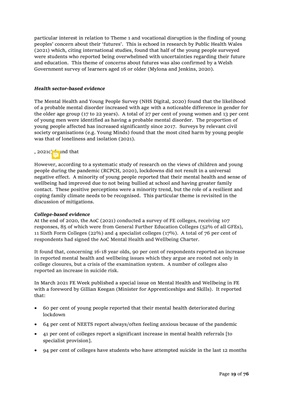
Page 19 of 76
particular interest in relation to Theme 1 and vocational disruption is the finding of young
peoples' concern about their 'futures'. This is echoed in research by Public Health Wales
(2021) which, citing international studies, found that half of the young people surveyed
were students who reported being overwhelmed with uncertainties regarding their future
and education. This theme of concerns about futures was also confirmed by a Welsh
Government survey of learners aged 16 or older (Mylona and Jenkins, 2020).
Health sector-based evidence
The Mental Health and Young People Survey (NHS Digital, 2020) found that the likelihood
of a probable mental disorder increased with age with a noticeable difference in gender for
the older age group (17 to 22 years). A total of 27 per cent of young women and 13 per cent
of young men were identified as having a probable mental disorder. The proportion of
young people affected has increased significantly since 2017. Surveys by relevant civil
society organisations (e.g. Young Minds) found that the most cited harm by young people
was that of loneliness and isolation (2021).
, 2021c) found that
However, according to a systematic study of research on the views of children and young
people during the pandemic (RCPCH, 2020), lockdowns did not result in a universal
negative effect. A minority of young people reported that their mental health and sense of
wellbeing had improved due to not being bullied at school and having greater family
contact. These positive perceptions were a minority trend, but the role of a resilient and
coping family climate needs to be recognised. This particular theme is revisited in the
discussion of mitigations.
College-based evidence
At the end of 2020, the AoC (2021) conducted a survey of FE colleges, receiving 107
responses, 85 of which were from General Further Education Colleges (52% of all GFEs),
11 Sixth Form Colleges (22%) and 4 specialist colleges (17%). A total of 76 per cent of
respondents had signed the AoC Mental Health and Wellbeing Charter.
It found that, concerning 16-18 year olds, 90 per cent of respondents reported an increase
in reported mental health and wellbeing issues which they argue are rooted not only in
college closures, but a crisis of the examination system. A number of colleges also
reported an increase in suicide risk.
In March 2021 FE Week published a special issue on Mental Health and Wellbeing in FE
with a foreword by Gillian Keegan (Minister for Apprenticeships and Skills). It reported
that:
• 60 per cent of young people reported that their mental health deteriorated during
lockdown
• 64 per cent of NEETS report always/often feeling anxious because of the pandemic
• 41 per cent of colleges report a significant increase in mental health referrals [to
specialist provision].
• 94 per cent of colleges have students who have attempted suicide in the last 12 months